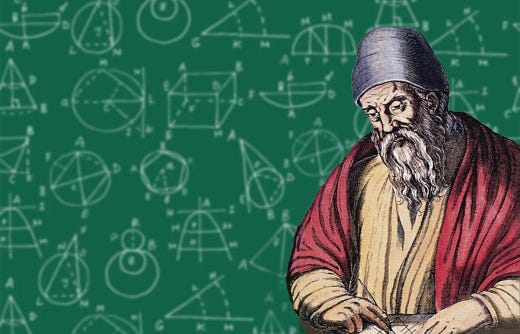The Subversive Art of Geometry
To study Euclid is to engage in a discipline that is valuable not because it produces wealth but because it trains the mind to see order, harmony, and truth.
As modern education shifts its focus toward economic and technological outcomes, the study of geometry as a liberal discipline stands as a quietly subversive act. Rooted in the classical tradition, the study of Euclidean geometry is more than an exercise in mathematical reasoning; it is a pathway to cultivating the intellect, training the soul in order, and engaging with the fundamental structures of reality. The discipline, as understood by the Greeks, does not merely impart technical knowledge but refines the mind to perceive truth itself. In this way, geometry embodies a revolutionary act: the deliberate pursuit of knowledge for its own sake.
The Classical Understanding of Geometry
For the classical mind, knowledge was not fragmented into discrete subjects but part of a unified pursuit of wisdom. The Quadrivium—arithmetic, geometry, music, and astronomy—stood as an essential framework in classical education, with geometry holding a place of distinction. Unlike modern mathematical instruction, which often prioritizes rote application, classical geometry compels the student to reason through logical demonstrations, fostering habits of disciplined thinking. Euclid’s Elements exemplifies this intellectual rigor, presenting a system of thought in which each theorem follows necessarily from self-evident axioms.
Plato, in The Republic, famously inscribed above the entrance to his Academy: "Let no one ignorant of geometry enter here." To Plato, geometry was more than a mathematical exercise; it was a training ground for the mind to grasp higher truths. In the Meno, Socrates demonstrates that knowledge is recollection, using a geometrical proof to reveal how the human soul, properly guided, can arrive at truth through reason. This classical approach to geometry, grounded in demonstration rather than mere computation, elevates the study of mathematics to a philosophical endeavor.
Euclid’s Elements: A Training in Truth
Euclid’s Elements remains one of the most influential works of all time, a text studied by scholars, philosophers, and statesmen for over two millennia. Its impact extends beyond mathematics into the realm of intellectual formation. The work’s methodical progression, from simple definitions and postulates to complex theorems, provides an unparalleled training in logic. The student of Euclid does not merely learn isolated facts but is trained to think in a structured, ordered way. This approach stands in stark contrast to contemporary educational trends, which often prioritize subjective interpretation over objective reasoning.
Moreover, the study of Elements instills intellectual humility. The student quickly learns that a false assumption, no matter how seemingly insignificant, results in contradiction. In a world increasingly driven by ideological assertions rather than rational discourse, geometry provides an antidote: an encounter with absolute truth. When a student demonstrates that the sum of the angles in a triangle is always 180 degrees, he engages in an act of discovery that transcends personal opinion. The truth of the proposition is not contingent upon external factors; it is intrinsic to reality itself.
Geometry as a Subversive Pursuit
Why, then, should the study of Euclidean geometry be considered subversive? In a society that values utility above contemplation, efficiency over wisdom, and pragmatism over truth, the pursuit of knowledge for its own sake is an act of rebellion. The modern world views education as a means to an end—whether economic prosperity, social mobility, or technological advancement. Geometry, however, refuses to be reduced to such terms. To study Euclid is to engage in a discipline that is valuable not because it produces wealth but because it trains the mind to see order, harmony, and truth.
Furthermore, the rigorous discipline required in classical geometry resists the intellectual passivity encouraged by contemporary education. Modern pedagogical trends often emphasize ease, accessibility, and self-expression, while classical geometry demands rigor, perseverance, and submission to objective truth. A student who wrestles with Euclid’s fifth postulate or the Pythagorean theorem is engaged in an act of intellectual virtue, resisting the inclination toward mental laziness. The result: such disciplined study cultivates the rare ability to reason independently.
Finally, classical geometry restores a vision of education as a moral endeavor. To think geometrically is to participate in a tradition that seeks not only knowledge but wisdom. Euclid’s propositions are not arbitrary conventions but reflections of a deeper rational order inherent in the cosmos. The act of studying them trains the mind to recognize, respect, and delight in that order. In this sense, the study of geometry becomes an act of formation, shaping the student’s soul in accordance with the good, the true, and the beautiful.
Michael S. Rose, a leader in the classical education movement, is author of The Art of Being Human (Angelico), Ugly As Sin and other books. His articles have appeared in dozens of publications including The Wall Street Journal, Epoch Times, New York Newsday, National Review, and The Dallas Morning News.






At Thomas Aquinas College, all freshman study geometry through Socratic discussion of Euclid’s Elements. Right now I’m studying The Republic, but someday I plan to dive into Euclid.